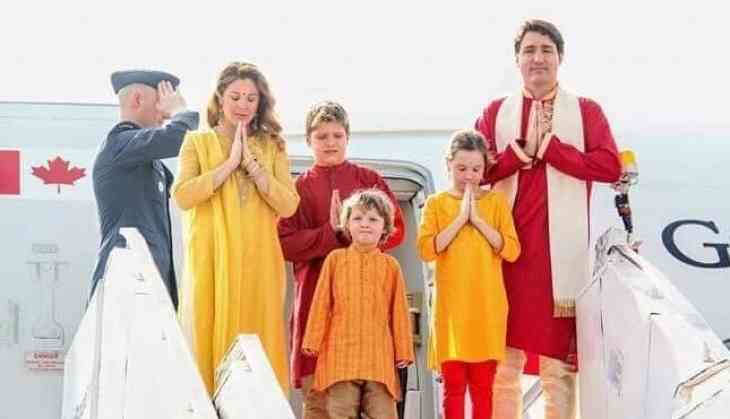How the Trudeau row exposed India's hypocrisy

The recent visit of Canadian Prime Minister Justin Trudeau, the controversies and the treatment he received from the Indian authorities continues to dominate the political discourse in Punjab. What continues to get exposed is the double face of of the so called mainstream political parties and their leaders along with that of the Indian agencies and certain sections of the media with allegations continuing to fly all around.
On Monday, it was Shiromani Akali Dal leader and the present president of Delhi Sikh Gurudwara Management Committee (DSGMC) Manjit Singh GK who called the role of Indian intelligence and security agencies along with a few media groups and former 'extremist' Jaspal Atwal during Trudeau’s visit as 'suspicious'.
Responding to his pictures taken at Rakabganj gurudwara going viral, he said that Atwal had come to meet him to say thanks for the efforts made for pruning of home ministry's 'blacklist' that had seen his name being deleted.
GK alleged that investigations had revealed that Atwal had posted on Facebook information along with the photo of Bharatiya Janata Party's (BJP) national spokesperson Nalin Kohli who is also holding important official positions in central government bodies. The information was that Kohli would be a guest on a radio talk show on radio 'Media Waves' with which Atwal was working. He said that Atwal was in Delhi on February 1, 2017 and had also posted pictures taken during his visit to Gurudwara Rakabganj, Red Fort, a five start hotel and Darbar Sahib at Amritsar.
GK has questioned that if Atwal was a 'Khalistani terrorist' then how did come to India in July 2017? “What is his friendship with Nalin Kohli? How did he reach the highly guarded Red Fort, North Block and South Block?”
He has further raised doubts that Indian intelligence agencies hatched a conspiracy to sabotage Trudeau’s visit to India and brand Sikhs as separatists in which Punjab government under Captain Amarinder Singh. Some prominent journalists and news organisations also vitiated the atmosphere with 'baseless' stories. GK said he does not consider Atwal a terrorist as he has already served his sentence.
Observers say that GK's stand cannot be seen in isolation as Akali leaders have been talking about “separatist” forces operating from Canadian soil in the wake of the Punjab Assembly polls. The Akalis were miffed after Sukhbir had to cancel his trip to Canada in 2013 in the face of opposition from the Punjabi diaspora there. Akali minister Sikandar Singh Maluka also had to face a strong reaction during his visit to the United States and Canada.
Ironically the Akalis now attacking the Indian agencies smacks of political opportunism and compulsion particularly when the SAD is an ally of the BJP at the Centre as well as in Punjab.
The same perception about the double face holds true for the Congress as well as it was Amarinder who had refused to meet Canadian defence minister Harjit Sajjan a few months back calling him a 'Khalistani sympathiser' but did a volte face when he met both Trudeau and Sajjan along with others in Trudeau's team last week. Amarinder too had to cancel his visit to Canada ahead of the Punjab polls in the face of resistance from the diaspora.
The general perception in Punjab is that Amarinder simply toed the Centre's line in his meeting with Trudeau where he handed over a list of nine operatives allegedly involved in financing and supplying weapons for terror
activities and 11 Canada-based elements allegedly involved in Punjab's drug trade, whom the state government wants extradited.
Observers say the meeting between Trudeau and Amarinder that was made a part of the former's itinerary at the 11th hour has proved to be a face-saving exercise in the face of speculations that were doing the rounds that Trudeau would not interact with him. This would have been a big embarrassment.
Meanwhile, the United Akali Dal (UAD) too has criticised the Narendra Modi led BJP government at the centre for deliberately cold-shouldering Trudeau.
Party leader Captain Chanan Singh Sidhu said that the Modi government's attitude smacks of fake nationalism inspired by the idea of a Hindu Rashtra. He said that the Centre saw to it that the bilateral issues of India and Canada stood ignored and the whole visit was used in the light of pitting Sikhs versus India while trying to show the former in a bad light.
On the other hand, Trudeau's critics in Canada say that he has gone overboard in wooing Sikhs. For instance, they said that the observance of a Sikh Heritage month a couple of years back and an Akhand Path at the Canadian parliament after Trudeau's victory amounted to a dilution of the country's secular ethos.
The debate around Trudeau's visit is not expected to die down soon particularly when Punjab along with other states starts gearing up for the Lok Sabha polls a little more than a year away.
In an interesting take on the issue, a Toronto columnist Jaspreet Bal in her piece in *Washington **P**ost* has pointed, “Last week saw the dusting off of the trope of the Sikh terrorist. Journalists have been pulled out of retirement to make their same tired statements. There are endless experiences of being Sikh Canadian; to group us all as terrorists is not only harmful but also lazy journalism. The media coverage this past week, which has rushed to reclaim that radicalism is flourishing in Canada, has not paused to make the distinctions that Sikhs are not terrorists. Asking for basic rights, speaking out about human rights abuses and contemplating a day when your people are not discriminated against does not make you an extremist. One can only assume these elementary distinctions are disregarded not out of apathy but rather out of a willful attempt to paint all Sikhs with one brushstroke.”
One thing is for sure, the Indian establishment and media have ensured that Khalistan finds a place in international political discourse once again.


